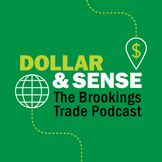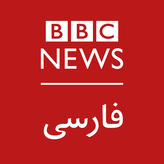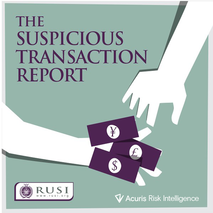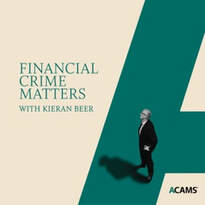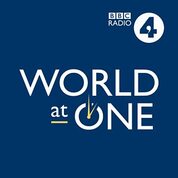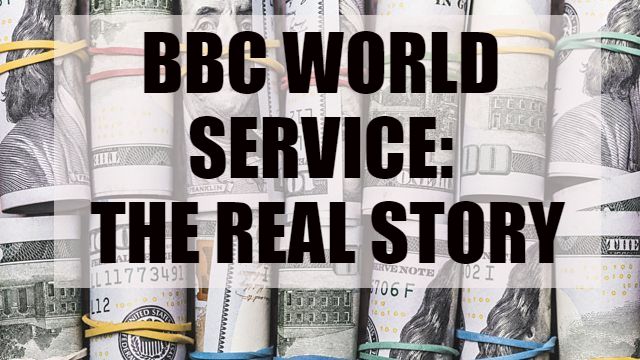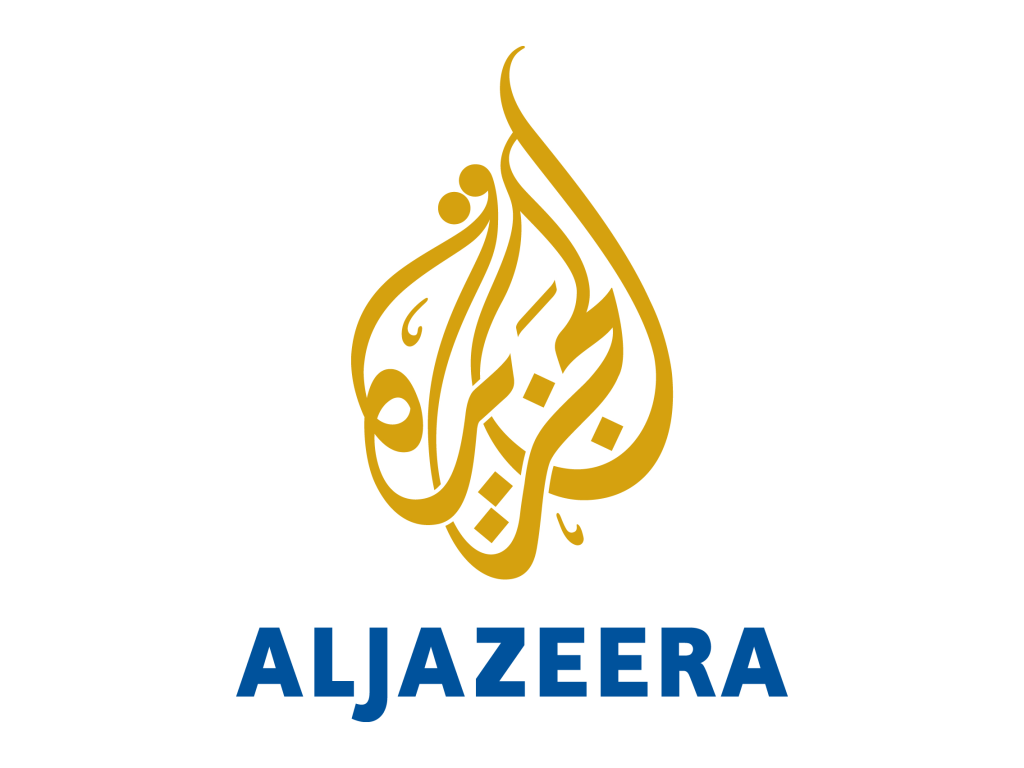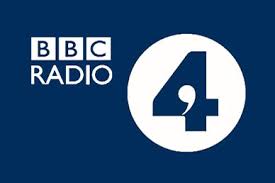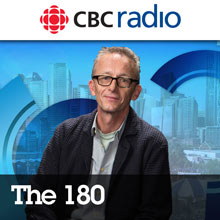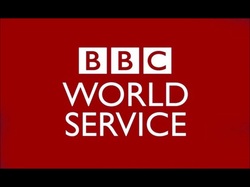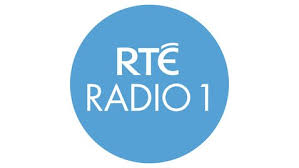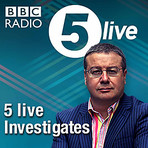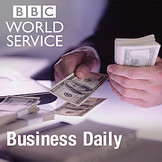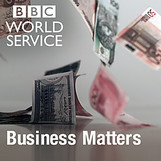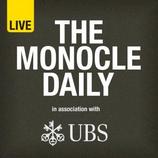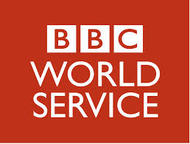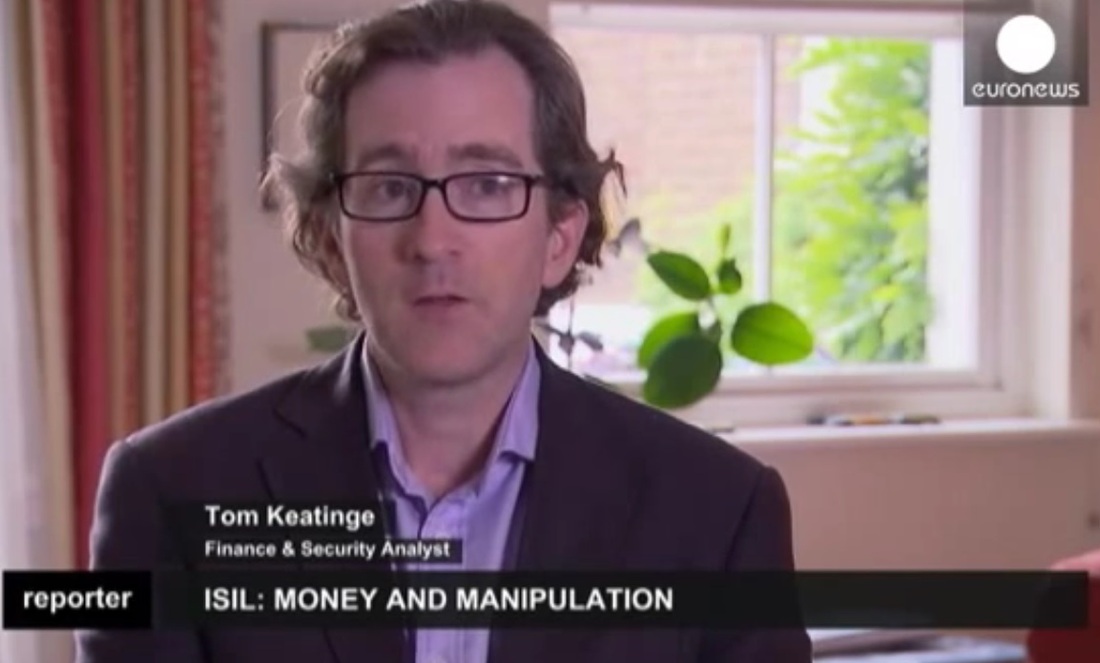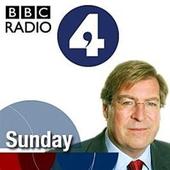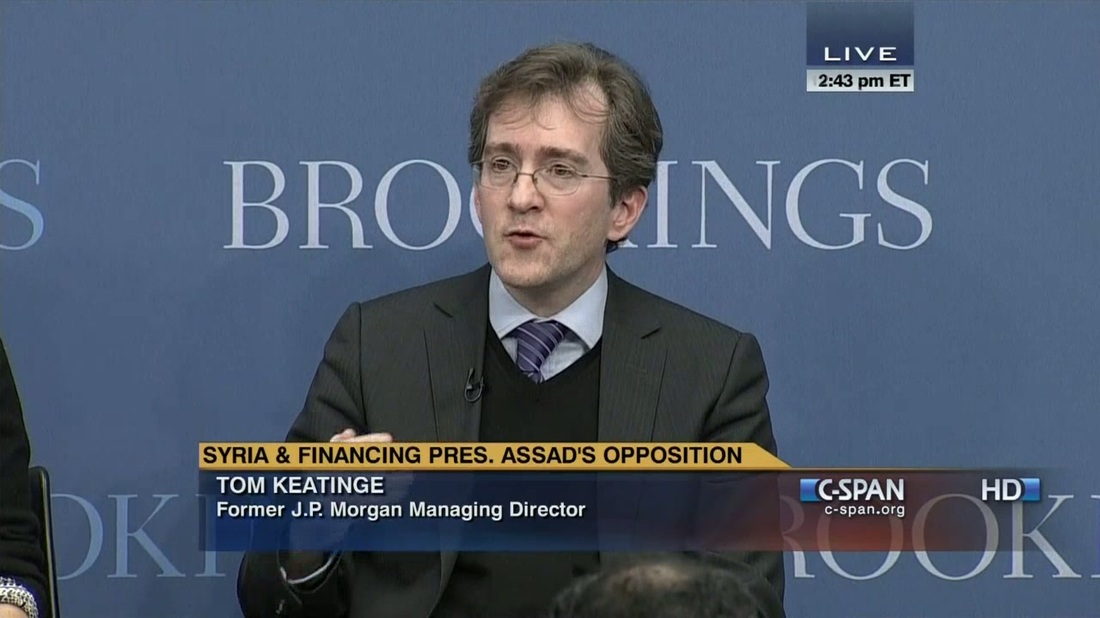Selected Recent Print, Broadcast & Interview Contributions
Tom Keatinge is Director of the Centre for Financial Crime & Security Studies at the Royal United Services Institute (RUSI). He was formally an investment banker at J.P. Morgan for 20 years. He is available for broadcast interviews and has recently appeared on:
TV: Al-Jazeera (English, America & Arabic), CNBC Arabia, Euronews, BBC TV's Newsnight, Panorama, Daily Politics, News Channel and the Victoria Derbyshire Show, PBS Frontline, German TV ARD, Deutsche Welle, CSPAN, BBC World TV's GMT, Business Edition, and Newsday, BBC Persian, MSNBC, Voice of America, CNBC, TRT, Dubai TV, and the Islam Channel.
Radio: Times Radio, BBC Radio 4's Today Programme, 'Sunday', 'File on 4', MoneyBox, and PM, BBC 5 Live Investigates, BBC World Service's Newsday, Newshour, Business Daily, and Business Matters, BBC Radio Wales, BBC Radio Scotland, BBC Radio Northern Ireland, BBC Radio Foyle, RTE Radio 1, Monocle 24, SiriusXM Radio 'The Morning Brief', LBC London Radio 'The Morning News', Radio France International, CBC Radio (Canada), Horizont (Bulgaria Radio).
Headshot is available here: RUSI high resolution.
Contact details here: vCard
TV: Al-Jazeera (English, America & Arabic), CNBC Arabia, Euronews, BBC TV's Newsnight, Panorama, Daily Politics, News Channel and the Victoria Derbyshire Show, PBS Frontline, German TV ARD, Deutsche Welle, CSPAN, BBC World TV's GMT, Business Edition, and Newsday, BBC Persian, MSNBC, Voice of America, CNBC, TRT, Dubai TV, and the Islam Channel.
Radio: Times Radio, BBC Radio 4's Today Programme, 'Sunday', 'File on 4', MoneyBox, and PM, BBC 5 Live Investigates, BBC World Service's Newsday, Newshour, Business Daily, and Business Matters, BBC Radio Wales, BBC Radio Scotland, BBC Radio Northern Ireland, BBC Radio Foyle, RTE Radio 1, Monocle 24, SiriusXM Radio 'The Morning Brief', LBC London Radio 'The Morning News', Radio France International, CBC Radio (Canada), Horizont (Bulgaria Radio).
Headshot is available here: RUSI high resolution.
Contact details here: vCard
Selected PrintWhy Europe can’t stop money laundering
Euromoney: August 30, 2019 Money-laundering scandals have dealt another blow to the reputation of Europe’s financial architecture. Does the EU stand any chance of convincing the rest of the world that it is getting tough on financial crime and fixing the leaks in its system? British far-right extremists being funded by international networks, report reveals The Independent: May 31, 2019 Research warns authorities are ‘overlooking’ far-right funding networks because of focus on Islamist terrorism MPs call for database of people linked to ‘dirty money' The Financial Times: March 8, 2019 Corruption crackdown as report says economic crime runs into ‘hundreds of billions’ Q&A: what is the 'Troika Laundromat' and how did it work? The Guardian: March 4, 2019 Billions of dollars moved from Russia to the west, mixing legitimate wealth with apparently fraudulent funds Banking leak exposes Russian network with link to Prince Charles The Guardian: March 4, 2019 Exclusive: investigation reveals how Troika Dialog channelled $4.6bn to Europe and US Russia’s oligarchs feel the chill in Skripal poisoning fallout The Financial Times: March 1, 2019 Enthusiasm for London wanes amid nervousness over UK’s response to attack. Brexit : les oligarques russes dans l'oeil du cyclone Les Echos: February 14, 2019 Installés dans les plus beaux quartiers de la capitale britannique, les oligarques russes « exilés » retiennent leur souffle. Pro Brexit, ils redoutent toutefois un possible durcissement des règles de transparence à court terme. U.S. Rejects New European Dirty-Money Blacklist The Wall Street Journal: February 13, 2019 The U.S. Treasury Department on Wednesday told American banks they can ignore an updated European Union blacklist of dirty-money hotspots, calling into question the EU’s methodology for developing the list, which includes several U.S. territories. UK money laundering reports hit record level in 2018 The Financial Times, January 10, 2019 Allegations of suspicious activity surge 10 per cent, National Crime Agency data show Britain’s war on dirty money lacks oomph The Economist, October 11, 2018 It is strong on transparency but weak on enforcement Russian cyber-attack: West stands united against Putin forces The Times, October 5, 2018 The US indictment of alleged Russian hackers, timed to coincide with the Dutch-led revelations, underlines an increasingly co-ordinated response to President Putin’s spy networks. Supervisors or enforcers: who steers AML in Europe? The Banker, October 1, 2018 Even after several revisions, the EU's anti-money laundering directive does not definitively answer the question of whether a unified EU approach to AML is needed and politically achievable. Is money-laundering scandal at Danske Bank the largest in history? The Guardian, September 21, 2018 Scale of fiasco highlights need for stricter regulation and cross-border force in Europe. London law firms feel chill from icy relations with Russia The Financial Times, May 31, 2018 Attack on Linklaters reflects changing climate in City towards Russian corporations Brexit poses risk of greater economic crime, Treasury is told The Financial Times, May 15, 2018 Anti-corruption campaigners warn MPs of heightened threat from particular countries Nuclear deal: Iran faces the most powerful organisation you’ve never heard of Middle East Eye, May 8, 2018 Regardless of what Trump decides, Iran must still satisfy an influential global body Coverage of Foreign Affairs Select Committee hearing on Russian Corrupt Money in London House of Commons, March 28, 2018 Including in: The Atlantic; New York Times; and The Guardian. Latvia: a banking scandal on the Baltic The Financial Times, February 23, 2018 Bribery allegations, a eurozone central bank governor arrested and a leading bank accused of laundering tens of billions of dollars. For the past 12 days, life in Latvia, the small but strategically important ex-Soviet republic by the Baltic Sea, has felt something like the plot of a TV crime drama. Banking crises cast shadow over Latvia financial landscape The Financial Times, February 20, 2018 The scandals shaking Latvia’s banking system are the latest in a series of crises over more than a decade in a country that has styled itself as a financial “bridge” between Europe’s east and west. Emerging Financial Crime Threats for 2018 ACAMS Today: December 12, 2017 As the techniques used by criminals continue to develop and become more sophisticated, what are the most significant threats faced by the industry in 2018 and which measures and developments will play the biggest role in addressing these threats? It's not just Russia — terror financiers are also using social media propaganda CNBC: December 18, 2017 Terrorists are turning to social media platforms to secure material support for their operations; Donors may not even know that they're giving their money to fund conflicts; Social media allow terror groups sometimes to explicitly broadcast calls for financial support Plan to crack down on £90bn City money laundering Financial Times: December 11, 2017 As much as £90bn of criminal money is laundered through the UK each year, according to the National Crime Agency. The test for the government’s updated anti-corruption strategy, published on Monday, will be how successful it is in stemming the flow. Global partnership can combat terrorism financing, say experts Free Malaysia Today: November 22, 2017 In view of fast-changing technology, experts say it is imperative to combat terrorism financing more efficiently via the latest methodology and solid collaboration globally. Experts on counter-terrorism financing believe multi-level players need to come together to identify terrorism financing and its instruments. Report: Governments Paying Terror Kidnap Ransoms ‘Put All Citizens at Risk’ VOA News: September 20, 2017 The lack of a unified approach by world governments to paying kidnap ransoms is putting the lives of citizens of all nationalities at greater risk and providing terror groups with a big source of finance, warns a new report from British analyst group the Royal United Services Institute. RUSI Report on Terror Ransom Payments Says Americans Are at Risk NBC News: September 12, 2017 American hostages are at greater risk of being murdered or tortured because some European nations pay multimillion-dollar ransoms to terrorist groups, a think tank warned Tuesday. London: a honeypot for property fraud The Times: August 22, 2017 Dirty money is being laundered in the London property market by criminals hiding behind anonymous shell companies, pushing up prices beyond the reach of ordinary Londoners Coverage of RUSI report re Human Trafficking and the Role of Financial Institutions The Evening Standard: March 15, 2017: European welfare benefits help fund ISIS fighters The Times: March 17, 2017: Banks become digital sleuths in fight against sex slave gangs European welfare benefits help fund ISIS fighters USA Today: February 23, 2017 Governments across Europe have accidentally paid taxpayer-funded welfare benefits such as unemployment funds, disability pensions and housing allowances to Islamic State militants who have used the money to wage war in Iraq and Syria, authorities and terrorism experts say. How to avoid getting caught for money laundering in the UK IB Times: February 23, 2017 Regulators and anti-money laundering (AML) enforcement officers are fighting a losing battle when it comes to transaction monitoring – so much so, a panel of AML experts agreed that even transactions in the low millions are likely to fly under the radar. Banks bar honest clients The Times: December 24, 2016 A controversial “blacklist” used by British banks to identify terrorists and potential money launderers has grown so bloated that it includes details of a three-year-old member of the royal family, The Times can reveal. Royal baby put on crime watchlist The Times: December 24, 2016 In between entries for Maulavi Walijan, a Taliban governor, and Nathaniel Wynter, a convicted money launderer, the name Maud Windsor stood out. Far from being a fraudster or even a politician like most of those on the World-Check database, at the time of her inclusion Ms Windsor was a nine-month old baby. Government urged to impose 'financial Asbos' to stop terrorism funding Daily Telegraph: September 7, 2016 The government should consider imposing tight financial restrictions on terror suspects to control spending and perhaps introduce financial ASBOs. Those claiming benefits would have even tighter restrictions imposed meaning they could only use taxpayers’ money for the purpose for which it was intended such as rent and food. Gaza aid workers fear restrictions on their work following Israel's Hamas claims AFP: August 11, 2016 Getting foreign aid to hundreds of thousands of Palestinians in Gaza has never been easy, but aid workers say Israeli allegations that several of their own colluded with Hamas could make it even harder. Terrorist Suspects in Europe Got Welfare Benefits While Plotting Attacks The Wall Street Journal: August 4, 2016 Belgian financial investigators looking into recent terror plots have discovered a disturbing trend: Some of the suspects were collecting welfare benefits until shortly before they carried out their attacks. Italy ponders military intervention in Libya The Economist, May 5: 2016 NO COUNTRY has more to gain from ending the chaos in Libya than Italy, the former colonial power. Italy is the natural destination for migrants setting off from Libya—and an obvious target for Islamic State (IS) terrorists based there, who have repeatedly threatened Rome. OPINION: Why governments should be open to paying ransom CBC: May 1, 2016 "Canada does not and will not pay ransom to terrorists, directly or indirectly". Prime Minister Trudeau said those words after a Canadian hostage w_as killed by a militant group in the Philippines. The group had demanded a ransom, but it was not paid. While there is debate over whether Canada has paid ransom in the past, it is most often argued by politicians and academics that countries should never pay, as it may entice more kidnapping in the future. There is another view, that countries like Canada, the UK, and the United States, should leave themselves some room to manoeuvre, and that an absolute opposition to negotiation and ransoms may be dangerous. What the Panama Papers don’t say about global finance is just as troubling Washington Post: April 14, 2016 Documents from the secretive Panamanian law firm Mossack Fonseca reportedly suggest that major banks have helped well-heeled clients to conceal their money in anonymous accounts around the world. Yet those banks are sometimes denying accounts to clients in poor countries, on suspicion that they might be involved in laundering money, financing terrorism or avoiding taxes, according to experts on the international financial system. Panama Papers: Putin associates linked to 'money laundering' BBC News: April 3, 2016 A suspected money laundering ring involving close associates of Vladimir Putin has been uncovered in a leak of confidential documents. It’s dollars only in the cash-strapped caliphate The Times: February 18, 2016 A campaign led by the US to destroy the sources of Islamic State’s income has left the world’s wealthiest terrorist group in a financial crisis and put the jihadists on an austerity drive. Charities and terrorism: 'deadly threat' or a distraction from real issues facing sector? The Guardian: February 9, 2016 A Charity Commission report on tackling abuse and mismanagement in charities shows a rise in terrorism-related cases but this remains a small proportion of overall investigations VICE News Reveals the Terrorism Blacklist Secretly Wielding Power Over the Lives of Millions Vice News: February 4, 2016 Investigation into the operations of World-Check Airstrikes reduce Islamic State oil revenue USA Today: January 8, 2016 An air campaign aimed at crippling the Islamic State’s lucrative oil smuggling business has reduced the terror group's revenue from a peak of about $1.3 million a day to less than $1 million, a top State Department official said. Co-op Bank shuts down account belonging to Palestinian NGO Friends of Al-Aqsa ‘without explanation’ The Independent: January 7, 2016 A British NGO that supports Palestine has called for public support after its Co-op Bank account was closed. Friends of Al-Aqsa first realised that its account with the Co-op Bank was not working when it tried to access services in December. Isis: British attacks on Daesh oil fields seek to strangle terrorist finances in Syria IB Times: December 4, 2015 Islamic State (Isis) is banking as much as $3m (£1.98m) a week from oil sales to smugglers and the local market as US and British air strikes attempt to destroy the infrastructure that allows Daesh (IS) to pump and refine crude in its strongholds in eastern Syria. Moscow steps up attacks on Turkey as it accuses Ankara of letting Isis smuggle out oil The Independent: November 28, 2015 Vladimir Putin has accused Ankara of permitting jihadists to smuggle oil across its border, in a ratcheting up of tensions following the shooting down of a Russian jet. Grenzenloser Schrecken fuer 25.000 Euro Handelsblatt: November 18, 2015 Die G20-Staaten wollen die Geldquellen von Terroristen versiegen lassen. Doch für die Angriffe des IS sind nicht viele Mittel nötig. Im Interview spricht ein Finanzierungsexperte auch über die Verantwortung von Banken. Also in English Cutting Off Isis Oil Production Could Lead To An Uprising Against The Terrorist Group, Claims Defence Expert Huffington Post UK: November 17, 2015 Destroying Isis’s ability to extract and sell oil could lead to an uprising from those living underneath the terrorist group, an international finance expert has claimed. G20 Leaders Agree to More Co-ordinated Counter-terrorism Efforts After Paris Attacks CityAM: November 16, 2015 Global leaders will double down on coordinating their counter-terrorism efforts today, calling for enhanced coordination and security measures after simultaneous attacks in Paris killed at least 129 people on Friday. Draft statements revealed over the weekend from the G20 leaders meeting in Antalya, Turkey, called for enhanced information exchanges to cut off funding for terrorist activities, as well as stricter border controls and more rigorous aviation security. ISIS Gold Coins at the Heart of Jihadinomics The Times: September 2, 2015 Isis has waded into the economic debate amid fluctuating world markets with its own version of jihadinomics. The insurgent group has released an hour-long film attacking the “satanic” global financial system and explaining how it intends to create an “economic 9/11” by banning paper money. Iranian militia to grab British cash The Times: August 26, 2015 Iran’s hardline religious militia is about to receive a rush of funds from Britain and the West after taking control of hundreds of companies that do not appear on sanctions lists. Call for action to stop Islamic State 'funding UK plots with student loans' Evening Standard: August 18, 2015 Security experts today called for new controls over student and payday loans as they warned that it is “frighteningly easy” for Islamic State supporters in Britain to use the money to fund terror attacks here. Inside the Underground Trade to Sell Off Syria's History BuzzFeed: July 31, 2015 The trade in stolen antiquities from Syria funds all sides of the civil war that has engulfed the country. BuzzFeed News’ Mike Giglio traveled along its porous border with Turkey to meet the people involved in this black market, from grave robbers and excavators to middlemen and dealers. Isis: Clamp down on wire transfers to disrupt terrorists, says counter terrorism boss International Business Times: June 29, 2015 More than half of the 300 people charged last year by the Metropolitan police counter terrorism unit committed a financial crime — many were sending money overseas to help fund terrorist groups such as Isis. Isis: People Trafficking, Smuggling and Punitive Taxes Boost Islamic State economy International Business Times: June 16, 2015 Once branded the best-funded terrorist group in the world and banking up to £1m per day from oil sales, bank robberies, extortion, smuggling and punitive taxes on local citizens, IS has had its funding squeezed over the past six months. Isis: Inside the Struggling Islamic State Economy in Iraq and Syria International Business Times: April 11, 2015 After a bumper year in 2014, the Islamic State (Isis) economy is in dire straits. Pushed out of the oil fields it controlled in Iraq and hampered by increasing scrutiny of foreign banking transfers from wealthy donors, there are already reports in Mosul and other cities that IS is overstretched. Fair business for Muslims? openDemocracy: April 6, 2015 Counter-terrorism regulation is having a corrosive effect on charity banking worldwide. International banks, under punitive US anti-terrorism laws, are increasingly terrified. And the real losers are Muslims. Coverage of ODI Report 'UK Humanitarian Aid in the Age of Counterterrorism: Perceptions and Reality' (5 Mar '15) Al Jazeera English, Financial Times, The Guardian, The Independent, The Times, New York Times, Reuters UK, Yahoo, Third Sector, Civil Society, Thomson Reuters Foundation. Storify of Coverage can be found here Britain Must Change Its Cruel Hostage Policy The Times: January 31, 2015 The prime minister’s stubborn stance on refusing to pay ransoms has left him looking isolated and behind the times Commentary for Asahi Shinbun re Hostage Kidnapping Asahi Shinbun: January 23, 2015 Geldprobleme beim IS? Deutsche Welle: January, 2015 Die Dschihadisten-Organisation "Islamischer Staat" (IS) gilt als finanzstärkste Terrorgruppe der Welt. Weil aber auch ihre Kosten gewaltig sind, könnte sie finanzielle Probleme bekommen. Coverage of Demos Report 'Uncharitable Behaviour' (31 Dec 2014) Daily Mail; Forbes; Independent; Guardian; IRIN News; Russia Today; Third Sector; Civil Society; Open Democracy These are the Faces of the World’s Most Wanted Environmental Fugitives Washington Post: December 3, 2014 The millions of dollars Al-Shabaab draws from exploiting charcoal sloshes into its general fund, which it leverages to arm fighters, kidnap people for ransom and plan attacks to broaden its grip on the national charcoal industry. "Der IS will keinen Profit, er will, dass es knallt" Die Zeit: October 13, 2014 Der IS verdient täglich bis zu drei Millionen Dollar mit Ölverkäufen, schätzt Terrorexperte Tom Keatinge. Der Ex-Investmentbanker forscht zur Terror-Finanzierung. ISIS IMPACT: Iraq’s Neighbours Count the Cost of Conflict Emerging Markets: October 11, 2014 The rise of Isis in Iraq, coupled with Syria’s civil war, is wreaking havoc on the economies of its neighbours, Jordan and Lebanon. Both countries have received limited outside support, a myopic response from the international community that will surely create more unrest and hardship in the future. «Schweiz ist für Illegales ein unattraktiver Markt» Handelszeitung: October 9, 2014 Terror: Ex-Investmentbanker und Terrorismus-Finanzexperte Tom Keatinge über die Finanzierung der IS und die vorbildliche Rolle der Schweizer Banken, wenn es um die Abwehr von Terrorgeld geht. Bankers Lose Their Appetite Charity Finance Magazine: October 2014 Periodically, banks exercise their right to close accounts with little notice and no explanation. Tom Keatinge questions why this might be. Insight - Islamic State's financial independence poses quandary for its foes Reuters: September 11, 2014 "It's about controlling financial nodes...because there's significant value in that control. And the more finance you earn, the more you can develop. It's a reinforcing circuit." Finsbury Park Mosque worshippers demonstrate outside HSBC bank over account closure Third Sector: August 18, 2014 Risk/reward assessment drives banks' decision-making process More UK bank accounts held by Muslim organisations risk closure The Guardian: August 10, 2014 Money laundering and counter-terrorism legislation behind move to close accounts, not Islamophobia, analyst says ISIL Exploit Poverty to Expand Recruitment Middle East Eye: June 30, 2014 High unemployment across the region could boost ISIL ranks, as the group seek to establish a far-reaching caliphate Qatar’s 2022 World Cup: An investment legacy own goal? Arabian Business: June 26, 2014 ISIS Advance in Iraq Forces Gulf Donors to Rethink Their Patronage The Christian Science Monitor: June 18, 2014 Gulf donors who backed rival militants in Syria's civil war are being drawn to ISIS by its success in Iraq, whose government accuses Saudi Arabia of supporting a Sunni rebellion. Hostile Takeover Financial Times: June 18, 2014 There are remarkable similarities between corporate finance and the financial tactics of terrorists ISIS in Syria and Iraq: "Sir, As a former capital markets banker and now analyst of finance and security, I am struck by the business model of Isis (“Selling terror: how Isis details its brutality”, June 18). A disruptor with an enticing product that raised seed funding from rich individual backers and attracted foreign expertise in the jihadi “war for talent” via a “guerrilla” social media marketing campaign, before launching an audacious dawn raid on a much larger rival financed by the target’s cash-rich balance sheet. It has even co-opted a defunct City brand as its name." U.S. Sanctions More Russians Foreign Policy: April 28, 2014 Washington blacklists more Russian officials, companies over Ukraine. Terör finansmanında Türkiye haftası Hürriyet: February 9, 2014 A review of the upcoming FATF plenary meeting in Paris and what it means for Turkey. (In Turkish) Keeping remittances to Somalia flowing IRIN News: October 30, 2013 Never has the UK’s Somali community taken so much interest in a court case. Dahabshiil Holdings Ltd, by far the biggest company remitting money from the UK to Somalia, has taken Barclays to court to try to prevent the bank closing down its account, without which the company says it cannot legally continue to operate. Other remittance companies have already had their accounts closed, because of what banks say are security concerns about money laundering and terrorism. |
Speeches, TV & Radio InterviewsThe Impact of Terrorism on Economies
IB Times Interview: ISIS Financing, Dec 2015
|

